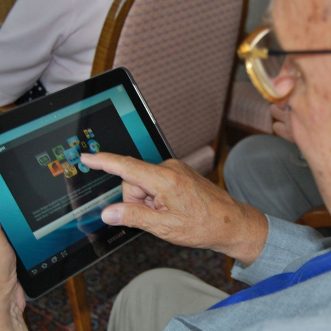
Succession
Monarchs don’t have the luxury of retiring. They are in the job until the very moment they die. Which means … Read More “Succession”

Monarchs don’t have the luxury of retiring. They are in the job until the very moment they die. Which means … Read More “Succession”

Cinderella’s sisters would do anything to get their feet into the glass slipper. They cut off their toes, and when that didn’t work, they tried trimming off a bit of their heels. All they did was create a bloody mess. The slipper wasn’t designed for them.
In business, it’s sometimes desirable to present your ideas in a format people are more comfortable with. That’s always something worth exploring. If you want to change minds, it’s helpful to start with the familiar as a way to introduce something new.
Be careful though.
If you find yourself mangling the idea to make it fit, this shoe is not for you.
Find (or make) a new one.

Now that the weather is turning autumnal, I’ve decided I need to work on getting a little bit fitter.
So every other morning I get up early, walk a couple of miles to one of my local parks, and use their outdoor gym equipment. Well actually, just the rowing machine thing, because I’m trying to get some upper body movement in.
Then I walk back again.
This morning was my second visit. The chap who was there the first time saw me coming and said “you after that machine there?”, and when I nodded, got his towel out and carefully wiped the seat for me, to get the dew off.
That wasn’t just a kind gesture, it was a ‘welcome to the club’, a little bit of encouragement, a nudge to start a habit. Because now I have to continue, so I don’t let him down as well as myself.
Who knew you could start a conspiracy so easily?

Yesterday brought home to me just how ageist our banks have become.
My husband helps to run a small non-profit organisation. Just over a year ago, they were told their account wasn’t active enough and would be closed.
13 months later they are still trying to open a replacement.
Doing anything face-to-face is out of the question – the banks simply won’t countenance that. Everything has to be done as a combination of phone calls with a bank contact and online.
First of all, the bank contacts are obviously overloaded. It took months to speak to anyone, and months for them to get back with a decision.
But the online part is the pits.
Because the non-profit does things properly, several signatories are involved. And as with many small, local non-profits, all of them are over 60, some well over 60 – because that’s how they have the time to devote to these causes.
They don’t all have mobile phones, and if they do, they don’t carry them around all the time. So a simple thing like 2-factor identification becomes a real difficulty.
Then, when they get things wrong, the error messages coming back are unhelpful, for example being told you have entered the wrong email address via an an email sent to that address (!!). So they get worried about getting things wrong, and do what seems sensible. They write things down, take things slowly.
But their fingers aren’t as fast as they used to be, so they get logged out of screens before they’ve had time to type things in.
And so they get frustrated, and have to spend more time getting together to try and sort things out.
These are intelligent, kind, generous people who are just trying to help their community. All they are looking for is somewhere safe to keep the money people have trusted them with; somewhere that will give them an audit trail for the few transactions they need to carry out.
Tough. Because banks have clearly decided that people don’t matter. And what could have taken a day to set up in-branch has taken 13 months – so far.
There’s a massive opportunity here for someone prepared to offer a no-frills, human service. Perhaps not for long, since the baby-boomer bump will be over in a decade or so, but for long enough to do decent business.
I wonder if anyone will take it.

A metaphor is a shortcut to understanding.
Faster than a speeding bullet, an idea moves fully-formed and sharp as nails, from my head to yours.
The problem is that if a metaphor doesn’t capture some deep truth, it’s actually pernicious. Dust thrown into the eyes. A quick and easy way to lie.
The elephant in the room is that everything that matters is far too complex to be captured in a single metaphor. We live in systems, not storybooks.
So maybe it’s time to see our metaphors for what they are – millstones round our necks, stopping us from making progress.
Let’s abandon them, and find better ways to imagine how the world goes round.

Here’s a question for next time you feel you need to plan for a big event or outcome:
“What’s the minimum you need to do to enable your people to make it happen?”
The answer might surprise you.
It will almost certainly be less than you thought.
And leave much more room for your people to shine.

If you know someone who’s ready to start disappearing from their business, please share.
I’m running a Define Promise workshop series starting on October 5th.
It’s an 8-week course with weekly homework and live tutorials, as part of a cohort of 6 maximum.
Just time to get your Promise of Value nailed before everything shuts down for Christmas, ready to pick up with Package Promise in January.
Check it out here:
Prefer a one-to-one experience?
Thank you!
Kirsten

Back in 1960 Albert B. Lord published a book called “The Singer of Tales“.
In it he shows that in a culture without writing, epic poems and stories are not shared by memorising them word for word, line for line. Each and every performance – even from the same speaker, is a reconstruction, a re-creation.
A storyteller is able to do this because they work within an enabling framework, in the form of some key constraints. For example:
The point is that even though each recitation effectively starts from scratch and is actually different from every other, it is perceived by both the speaker and their audience as being a word-perfect, faithful repetition of the last time they heard it. Every telling is perceived as identical to all other tellings, because against all the criteria that matter, it is.
Once we have writing, everything changes. Writing is of course a way of putting knowledge ‘in the world’, rather than ‘in the head’. But there are drawbacks. Multiple versions of an epic poem get written down, but from now on they are read, not re-created. All too often a single version becomes canonical – the one against which all others are judged. We gain in practicality, but lose sponteneity, creativity, surprise.
It seems to me though that it is possible to have the best of both worlds:
That’s what makes a good Customer Experience Score. Enough constraints to ensure the experience is perceived as consistent, plenty of room for a given person to make that experience personal. Written down so everyone can learn it, practice it and improve it. On purpose.

The reason you can wander around a new town centre without getting run over is that you don’t have to remember or even really know, how a town centre works. The information you need to navigate and interact with it successfully is built into its design.
Pavements tell you where you can walk. Kerbs tell you where the pavement ends. Different paving tells you which parts are pedestrianised. Black and white stripes tell you where you can cross the parts reserved for motor vehicles. Shopfronts and market stalls tell you where you can buy things. Litter bins tell you where to put rubbish.
Much of the knowledge of what a town centre is and how to use it is ‘in the world’, which means it doesn’t have to be in your head. Once you’ve encountered one town centre, you have a mental model – an enabling framework – that you can apply to the next, without having to remember every detail.
Knowledge ‘in the world’ enables us to use our experience to deal with the new and unexpected safely. When our town centre introduced ‘shared space’ – space that pedestrians and motor vehicles are meant to share nicely – they helpfully made it from patterned paving so walkers didn’t mistake it for a pedestrianised area, in black and white so that cars knew to expect pedestrians. They also added low-level signage to tell everyone this was something new.
It’s worked brilliantly.
Knowledge ‘in the world’ saves us brain space and effort.
So why do we business owners insist on trapping all the knowledge of how our business should work inside our heads?

I’ve missed out on so many diseases – whooping cough, diptheria, rubella, polio, tuberculosis – as a result of being inoculataed against them at an early age. And I am very grateful.
Now it seems that people can be ‘inoculated’ against spreading misinformation too.
By showing people youtube videos explaining the techniques used to manipulate them into liking and sharing, it seems people are more able to spot the manipulation happening in other videos.
That’s good news I think.
The bad news is that these videos are being developed by Google, who will decide which societies are ‘in need of’ inoculation.
The techniques are well known and have been used for centuries by politicians, newspapers and advertisers.
Perhaps, instead of relying on the kindness of Google,we could inoculate people early, and just start teaching this stuff in schools?